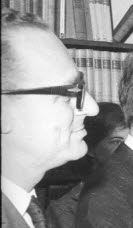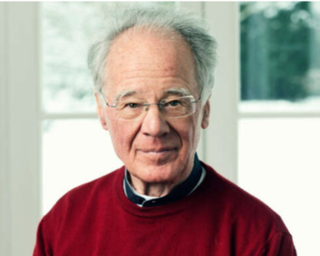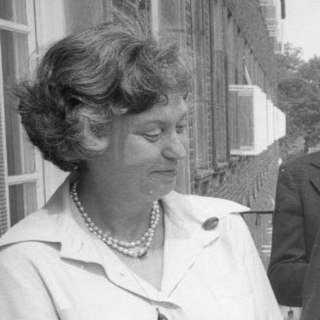Related Research Articles

Michael Andreas Gielen was an Austrian conductor and composer known for promoting contemporary music in opera and concert. Principally active in Europe, his performances are characterized by precision and vivacity, aiding his ability to interpret the complex contemporary music he specialized in.

Aribert Reimann is a German composer, pianist and accompanist, known especially for his literary operas. His version of Shakespeare's King Lear, the opera Lear, was written at the suggestion of Dietrich Fischer-Dieskau, who sang the title role. His opera Medea after Grillparzer's play premiered in 2010 at the Vienna State Opera. He was a professor of contemporary Lied in Hamburg and Berlin. In 2011, he was awarded the Ernst von Siemens Music Prize for his life's work.
Wilhelm Killmayer was a German composer of classical music, a conductor and an academic teacher of composition at the Hochschule für Musik und Theater München from 1973 to 1992. He composed symphonies and song cycles on poems by Friedrich Hölderlin, Joseph von Eichendorff, Georg Trakl and Peter Härtling, among others.
Christine Schäfer is a German operatic soprano.

George Alexander Albrecht was a German conductor and composer, who also worked as a musicologist and academic teacher. A prolific composer at a young age, he was Generalmusikdirektor (GMD) of the Staatsoper Hannover from 1965 for 30 years, where he led not only the major operas by Mozart and stageworks by Wagner, but contemporary composers, such as Aribert Reimann's Troades in 1987. He was GMD of the Nationaltheater Weimar from 1996, and taught at the Hochschule für Musik Franz Liszt, Weimar. Albrecht promoted the works of neglected composers such as Wilhelm Furtwängler, Hans Pfitzner, and Erwin Schulhoff.

Marlis Petersen is a German operatic coloratura soprano.

Hans-Jürgen von Bose is a German composer.
Walter Fink was a German entrepreneur and a patron of contemporary classical music. He is known for being a founding member, executive committee member and sponsor of the Rheingau Musik Festival, where he initiated a series of annual portraits of international composers of contemporary classical music.
Barbara Scherler is a German classical mezzo-soprano and contralto singer in opera and concert. She was a member of the Deutsche Oper Berlin and active in performances and recordings of operas of the 20th century.

Melusine is a 1971 German-language opera by Aribert Reimann, on a libretto by Claus H. Henneberg after Melusine, a 1920 play in four acts by Yvan Goll which transposes the legendary water-spirit to Goll's time. The opera was written for the Schwetzingen Festival, where it premiered in 1971. It was recorded in 2010.
Claudia Barainsky is a German operatic soprano. She has performed internationally, and won awards for her roles in contemporary operas such as Bernd Alois Zimmermann's Die Soldaten and Aribert Reimann's Medea.

Nicole Chevalier is an American operatic soprano, who debuted at the renowned Salzburg Festival in the summer of 2019. She was a member of the Komische Oper Berlin, and has been a freelance artist since 2017. Her repertoire includes bel canto as well as Mozart heroines such as Verdi's La Traviata, Donizetti's Maria Stuarda and Lucia di Lammermoor, Mozart's Konstanze in Die Entführung aus dem Serail, Elettra in Idomeneo, and stretches till Aribert Reimann's Medea. In 2016, she was awarded the German National Theatre prize Der Faust for all four female characters in Offenbach's Les Contes d'Hoffmann.
Michael Boder is a German conductor of opera and concert who works internationally. The chief conductor of the Royal Danish Theatre, he has conducted regularly at the Vienna State Opera, including the premieres of Cerha's Der Riese vom Steinfeld and Reimann's Medea. He also conducted the premieres of operas by Dusapin, Enescu, Henze, Lombardi, Penderecki and Trojahn.
Reinhard Peters was a German operatic conductor, violinist and an academic teacher at the Folkwangschule Essen. He was the Generalmusikdirektor for the opera companies Deutsche Oper am Rhein, Theater Münster and Deutsche Oper Berlin. He premiered music in opera and concert, such as Giselher Klebe's Die tödlichen Wünsche, Aribert Reimann's Melusine, Nicolas Nabokov's Love's Labour's Lost, and Wilhelm Killmayer's song cycle Tre Canti di Leopardi.
Wilhelm Killmayer, a German composer, wrote several song cycles, which form a substantial part of his compositions. The earliest cycle dates from 1953, the last was completed in 2008. He set poems by German romantic writers such as Friedrich Hölderlin and Joseph von Eichendorff, but was also inspired by French, Greek and Spanish poems, and by texts from the 20th-century poets Georg Trakl and Peter Härtling. He used mostly piano to accompany a singer, but also added percussion or other instruments, and scored some cycles in a version for voice and orchestra. His Hölderlin-Lieder, setting poems from the author's late period, were performed at major festivals and recorded.
Catherine Gayer is an American coloratura soprano, violinist, musicologist, and academic voice teacher. She made a career in Germany. A member of the Deutsche Oper Berlin for more than four decades, she is known for her performance in premieres of contemporary operas, such as Luigi Nono's Intolleranza 1960 at La Fenice in Venice, the title role in Aribert Reimann's Melusine at the Schwetzingen Festival, and Josef Tal's Die Versuchung at the Bavarian State Opera.

Carla Henius was a German operatic soprano and mezzo-soprano, voice teacher and librettist. She played a decisive role in promoting recent works by composers such as Arnold Schönberg, Karlheinz Stockhausen and Luigi Nono for the stage. She wrote the libretto for an opera by Aribert Reimann.
Waltraud Isoldé Elchlepp is a German protest song singer under the pseudonym Dominique, and an operatic mezzo-soprano and soprano who appeared at major German opera houses and festivals including the Bayreuth Festival. She took part in world premieres such as Reimann's Das Schloß and Bernarda Albas Haus at the Bavarian State Opera. Besides the standard repertoire, she appeared in roles such as Othmar Schoeck's Penthesilea at the Staatsoper Hannover.
Julia Bauer is a German operatic coloratura soprano who has appeared at major opera houses and also in concert and recital. She has had leading roles such as Zerbinetta and Lulu, and was Freia, Helmwige, Forest Bird, Woglinde and Third Norn in Der Ring in Minden.

Laura Aikin is an American operatic coloratura soprano. She is noted for her portrayal of the title character in Lulu, which has received very positive reviews in the press. She has also appeared as Mozart's Queen of the Night, Zerbinetta by Richard Strauss and in contemporary opera at international opera houses and festivals.
References
- ↑ "27.7. Joan Carroll wird 80". Der Neue Merker (in German). 2012. Archived from the original on 1 May 2015. Retrieved 19 September 2017.
- 1 2 3 4 5 Kutsch, Karl-J.; Riemens, Leo (2003). "Carroll, Joan". Großes Sängerlexikon (in German). Vol. 1 (4th ed.). Walter de Gruyter. p. 739. ISBN 3-598-11598-9.
- ↑ Hamilton, Frank (2011). "Opera in Philadelphia / Performance Chronology 1950–1974" (PDF). frankhamilton.org. Archived from the original (PDF) on 2 June 2019. Retrieved 19 September 2017.
- ↑ "February 27 Afternoon – Channel 5 1:30". TV Guide Chicago. 26 February – 4 March 1955. pp. A-13–A-14.
- 1 2 3 Schonberg, Harold (19 January 1964). "Opera: Lulu Comes to Boston in a Major Premiere". The New York Times . Retrieved 19 September 2017.
- 1 2 3 Ericson, Raymond (26 September 1971). "A Director With Design". The New York Times . p. 15. Retrieved 19 September 2017.
- ↑ Herbort, Harold (21 November 2012). "Auch aus Frankfurt nichts Neues über Bergs Lulu: Eine Gleichung mit zu vielen Unbekannten". Die Zeit (in German). Retrieved 19 September 2017.
- ↑ "Inane / Monolog". Schott Music . 2017. Retrieved 19 September 2017.
- ↑ "Inane / Monolog". opacplus.bsb-muenchen.de (in German). 2017. Retrieved 19 September 2017.
- ↑ "AGP 12". dream.cs.bath.ac.uk. Retrieved 19 September 2017.
- ↑ "Music in Our Time". BBC Genome Project. 16 June 1970. Retrieved 19 September 2017.
- ↑ "Blasons anatomiques du corps féminin". Schott Music . Retrieved 23 August 2017.[ permanent dead link ]
- 1 2 Ellmeier, Andrea; Ingrisch, Doris; Walkensteiner-Preschl, Claudia (2015). "Interpretinnen und die Bedeutung der Aufführungspraxis". Körper/Denken: Wissen und Geschlecht in Musik . Theater . Film (in German). Vienna: Böhlau. pp. 118–119. ISBN 9783205796282.
- ↑ "1970". Musik Informationszentrum (in German). 1970. Retrieved 19 September 2017.